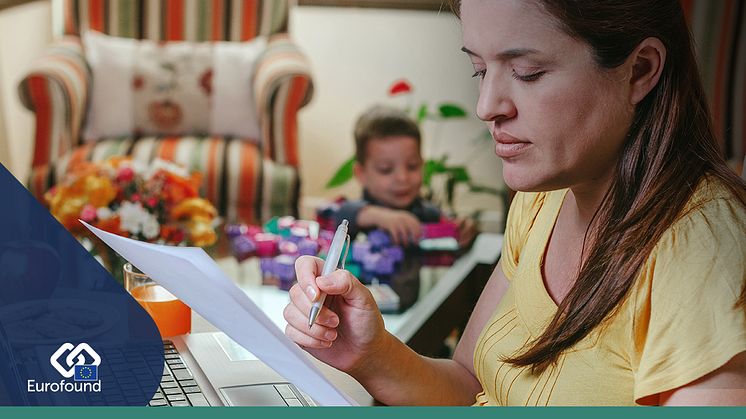
News -
High levels of telework in Luxembourg during confinement, work-life balance negatively affected
More than half of people surveyed in Luxembourg report starting to work from home due to the Coronavirus (COVID-19) pandemic, according to Eurofound’s Living, working and COVID-19 survey. This has gone hand in hand with respondents in Luxembourg reporting lower levels of job loss and financial insecurity when compared to other EU Member States. However, the survey’s work-life balance indicators show that people in Luxembourg experienced greater difficulty in balancing work and family responsibilities during the confinement period.
The First Findings of the Living, working and COVID-19 survey show that respondents in Luxembourg report the third lowest level of job loss in the EU at 15% – nearly half that of the EU27 average of 29%. Furthermore, 38% report a decrease in working hours, which is considerably lower than the EU27 average of 49.5%. Similarly, Luxembourg reports the second smallest share of respondents (6%) who think they will lose their job because of the pandemic, which is below the EU27 average of 15.6%. This is likely to have contributed to Luxembourg also having the second lowest level of respondents at 19% who report a worsening of their financial situation compared to the previous three months – below the EU27 average of 38%. Added to this, Luxembourg also has the lowest share of respondents in the EU with no savings, as the survey findings show that 14% of people in Luxembourg have no savings, which is half that of the EU27 average of 28%.
The generally less stark financial impact is likely to have been mitigated by the large proportion of respondents (56.8%) who reported starting to telework as a result of the pandemic – above the EU27 average of 36.8%. Nevertheless, the survey results show that widespread teleworking appears to have had a negative impact on work-life balance for respondents in Luxembourg. The survey results identify that Luxembourg reports the largest proportion in the EU reporting that family responsibilities prevented them giving the time they needed to their job. In addition, Luxembourg also reports the third largest share in the EU who found it difficult to concentrate on their work, either some or all of the time. The challenges presented during the lockdown period were also manifested by more than a fifth of respondents (22%) in Luxembourg reporting to have to work in their free time to meet work demands – the third highest level in the EU.
Although confinement measures presented a myriad of challenges, particularly in terms of work-life balance, it is positive to see that overall well-being and quality of life indicators in Luxembourg appear to have remained at some of the highest levels across the EU. Life satisfaction and happiness were both ranked at 6.9 (on a scale of 1-10), above the respective EU averages of 6.3 and 6.4. Similarly, 59% of respondents reported feeling optimistic for the future, which is the fourth highest level in the EU. However, this is a marked decrease from the 77% who reported feeling optimistic for the future in the 2016 European Quality of Life Survey. Although most quality of life indicators for Luxembourg were considerably above the EU average, the proportion of respondents reporting to feel lonely, and particularly tense, were both in line with the EU27 averages at 16% and 17% respectively, which may also reflect the impact that altered working circumstances have had on people in Luxembourg.
Eurofound has been monitoring and reporting on living and working conditions in Luxembourg, in comparison to other EU Member States, since the foundation of the agency in 1975.
Read more:
Publication: Living, working and COVID-19: First findings – April 2020
Publication: European Quality of Life Survey
Country profile: Living and working conditions in Luxembourg





